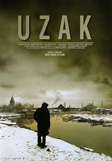
|
BBC
Four :
An Interview with Nuri Bilge Ceylan This interview
with the director of Uzak, Nuri Bilge Ceylan, was conducted by the World
Cinema Award production team in December 2004.
-Would you describe Uzak as an autobiographical film? Maybe about 50% autobiographical, but I couldn't say what is and what isn't. All my films are in some sense based on my own experiences, but once you start making the film you begin to forget which, because you change everything. -Why did you choose to use your own family to act in your films? To begin with I thought it would be cheaper and less risky. But after working with a cast of amateurs I found that they are actually more natural. They can create very nice dialogue and realistic gestures. In Uzak I worked with some professionals too for the first time, just in small roles, but the main parts are all amateurs. -Why do you have such a minimalist style? I just do what I like and it ends up like that. I don't like too much dialogue in a film because I don't think that is how people speak. People always have something to hide in real life, they leave a lot unsaid, so I prefer it if the audience understand the truth from gestures and expressions, or from the situation, rather than from spoken words. But I don't really think about my style, it's instinctive. -Tell us about the visual style of the film, for example the contrast of the snow-covered city with the apartment. This contrast helped to describe the situation of the young guy, because when he goes outside into the snow he is cold, and this emphasises the importance of the home with its warmth and luxury. So it underlines his situation in Istanbul, his dependence on his relative and his insecurity. I was very lucky that there was snow when we are shooting because it's quite rare in Istanbul. Some years it doesn't snow at all. -Tell me about the memorable scene with the overturned ship. That ship has been there for many years, actually some Turkish film-makers had already used it. The young guy wants to be a sailor, so I think the ship helped me a lot - it symbolised his situation. -There are several references to Tarkovsky in the film. Would you say he is someone who inspired your work? Tarkovsky is one of the directors I admire, but I specifically chose him because I wanted to film a long scene where they watch a movie together, and Tarkovsky had just the right kind of long unconventional scene for this purpose. Of course there are plenty of other directors I like, but Tarkovsky was the right choice for this film. -There's quite a sense of loneliness running through film, but there's also humour. Were those moments important to you? Of course, but I can't say that I forced myself to put it in. It's just how I see life. Even taking a sober look at the most tragic situations, I am the kind of person who always finds humour there. So it just comes out like that - it's not intentional. -Didn't you originally have a murder scene in the film? Yes, I actually shot this in the flat upstairs. They were then going to go on a trip together, to cleanse themselves of the dark feelings which this killing caused - I wanted to show some characteristics of the souls of the characters. But during the edit I realised that this murder would dominate the film, and I wanted the film to be quite eventless, with nothing much happening, like real life. So I decided to take this scene out.
|
